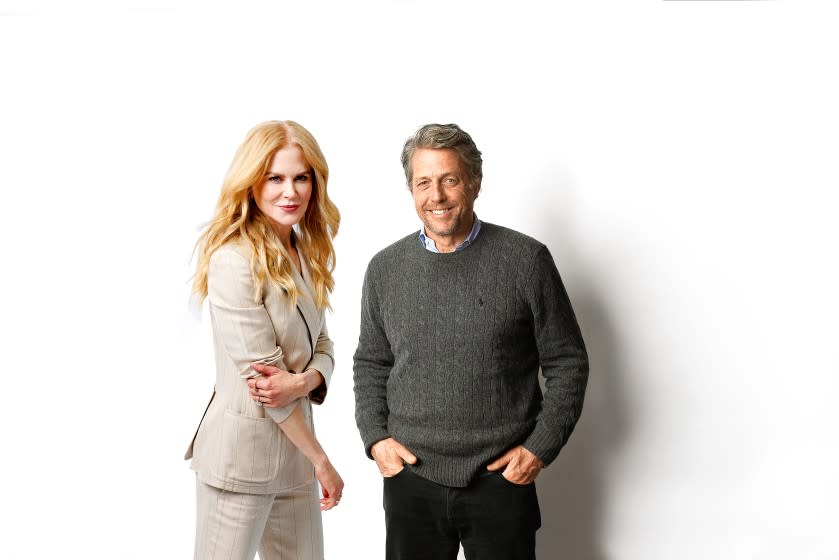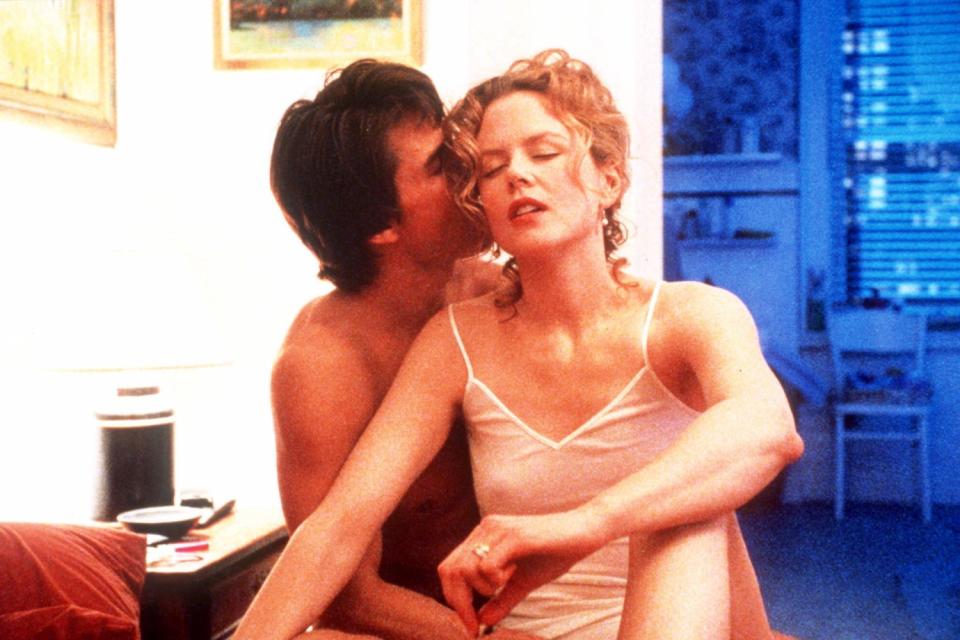Hugh Grant and Nicole Kidman: 'Notting Hill,' Lucy and that killer series, 'The Undoing'

- Oops!Something went wrong.Please try again later.
Hugh Grant is looking at Nicole Kidman, and something about her seems different, but he can't quite put his finger on it.
"Are you still playing Lucille Ball?" he asks. She's in Nashville; he's in London. We're sharing a screen and a little time together, and Grant is peering into the camera. "Since the last time I spoke to you, a few weeks ago, you look a bit like her. Even your outfit is a bit Lucille." This is absolutely not true and Kidman, who just finished shooting Aaron Sorkin's movie, "Being the Ricardos," about the relationship between Ball and husband Desi Arnaz, blushes. "It's so weird that you say that, Hugh. Why do you say that?"
"I've just been looking at you, thinking, 'Who does she remind me of?' F— it, it's Lucille Ball,'" Grant replies. Kidman laughs. "I paid him to say that."
Seven months after the finale of their HBO limited series, "The Undoing," in which they starred as Jonathan and Grace Fraser, Grant and Kidman have reconvened to answer questions that have haunted us well into this year. Also: Proper dishwasher use and why humans are prone to denial.
Nicole, I read that you were interested in co-starring with Hugh in "Notting Hill." How close did you come?
Kidman: In my head, I was close. [Laughs] But I was never in the running for it.
What would "Notting Hill" have looked like with Nicole instead of Julia Roberts, Hugh?
Grant: What's the political answer here? She would have been slightly less of the inaccessible star Julia was. [Pauses] But I'm not sure that's true. Nicole can be quite frostypants. It's a very difficult character Richard [Curtis] wrote there. She's pretty nasty. But Nicole has always been brilliant.
"Notting Hill" came out the same year as "Eyes Wide Shut." Given all the downtime you had making that movie in England, Nicole, you probably could have shot another film simultaneously.
Kidman: Well, strangely enough in that downtime I met a huge amount of people who were instrumental in changing my life and career. Tom [Cruise] was working, but I was able to go to the theater and see everything that was at the National and the Donmar, and I would go to Paris on the weekends. Having access to Europe for two years ... that's how long we shot.
Grant: Really? You shot for two years?
Kidman: Rehearsed and shot. We went over for three months and stayed for two years.
Grant: What was the maximum number of takes [Stanley Kubrick] made you do?
Kidman: Maybe over 120.
Grant: Don't be ridiculous.

Kidman: [mimes smoking a joint] "Cut. Again." That particular shot was maybe 128 takes.
Grant: You must have been pretty stoned by the end of it.
Kidman: I wasn't smoking weed.
Grant: Yeah you were.
Kidman: [Laughs] I don't kiss and tell, baby!
Did you follow the online reaction to "The Undoing" from week to week?
Grant: Some would say "uncoolly," I did. I only read the negative things. Same with reviews. I skip past the red tomatoes and go to the green ones.
Did anything stand out as you searched through the bad stuff?
Grant: I tell you what pissed me off. Or what saddened me. I was particularly proud of the fact that in two scenes — one in particular — I really emoted. I really cried. And if you'd asked me 10 years ago to cry in a scene, I would have said, "Forget it. I'm not that kind of actor. I can just about time a funny line. But I can't cry." And now I find I can and I could and I did. And when this crying scene was broadcast, a lot of people said, "That's so fake." But it was real, dammit!
It may be that I'm a very unattractive crier. I cried at the end of "Florence Foster Jenkins" when Meryl [Streep] is dying. And everyone was very proud of me. "That was wonderful. Amazing. Are you all right?" I loved that. I'd never had an "are you all right?" before. But by the time it came out, all the crying was gone.
Kidman: He can put himself down as much as he wants, but he's a fantastic actor. He tends to be a bit Eeyore, but he's not. He's a little bit more Christopher Robin than he lets on.
The finale did produce a few questions. Why do you think Jonathan brought the murder weapon back to the beach house?
Grant: I did have an answer for this scribbled in the margin of my script, because that's what actors do. They have to have a reason for everything. But I'm damned if I can remember it right now because it was a pretty stupid idea of Jonathan's. As I recall, the plan I invented in my head was he was planning to take it out in a boat and chuck it in the sea, but he just needed to talk to Grace first. And he assumed, in his infinite arrogance, that she wouldn't call the police and it would give him some time to get rid of it.
But instead, the son discovers it and brings it back to New York and hides it ...
Kidman: That's plausible that the son would want to protect his father and hide it ...
Grant: He puts it through the dishwasher twice. And we have one of those dishwashers that always leaves remnants on the glasses and things. So you must have been drinking little bits of Elena's skull because there wasn't enough rinse aid in the machine.
Kidman: He rinsed it first! That's what you do with the dishwasher!
Grant: You don't know what English dishwashers are like. They never work. You look at a glass and it's like a paella of last month's food.
Kidman: That's because somebody didn't clean and rinse the plates before they put them in the dishwasher.
But does a 12-year-old know to do that?
Kidman: My 12-year-old knows how to do it. I swear! My job when I was little was to stack and unstack the dishwasher. We'd have these things written out. My kids have very similar jobs.
I feel like I've failed as a parent. Take this to heart, Hugh. Teach your children early.
Grant: We put them in the dishwasher. It's easier than bath time.
The final scene with the helicopter landing on the bridge was dramatic. But people wondered how Grace and her father commandeered the helicopter so quickly.
Grant: If you're going to pick holes in the finale, let me ask you this: Did you think the bridge was high enough? That was my panic. I saw a picture of the bridge that we were going to shoot on, and I thought, "I could easily jump off that if it was a hot day for a nice cooling swim." It was pretty tiny.
Kidman: I remember you saying to me, "Have you seen the bridge? Piddling."
Grant: Piddling. It was something out of Legoland.
Kidman: I pictured it to be really tiny, like the Stonehenge in "Spinal Tap." And I was pleasantly surprised.
Miniature bridge aside, the emotions you both bring to the scene are wrenching. The one thing Jonathan couldn't bear to lose was his son's devotion. He gets off on adoration. As an actor, could you in any way relate to that?
Grant: [Laughs] Yes. Of course. We're all monsters. As Julie Walters says in "Paddington 2," actors are some of the most evil people on the planet. And we are. We're ghastly. We drone on about craft, about our gift to the world, but it's really just me, me, me. Look at me. I'm speaking for myself. I don't speak for Nicole Kidman.
Kidman: I'm OK with the light banter, but eventually I come back to the examination of who we are and why we're here. It's an incredible thing to enter into characters' minds and their ideas and have your whole life change. That discovery is the basis of what I do. [Pause] Aaaaanyway ... move on! Ask Hugh something!
OK. Since you followed the conversation as the series aired, what was the strangest theory about who might be the murderer?
Grant: My favorite was the people who thought it was my mother, who appears on one Facetime call. And she does look kind of nasty, I have to say.
Kidman: I heard the one where it'd be Lily [Rabe]. Me and Lily were the main culprits. I think Donald [Sutherland] ran third.
Grant: Donald. The boy. Your coats were blamed at one point.
Kidman: I remember shooting in the courtroom with all the extras and people watching and the first AD asked, "Who do you think did it?" And they always thought it was me! I'm like, "Thanks a lot. Throw the woman under the bus." I wouldn't have done [the series] if it was Grace. Too many times on screen, it's the woman, especially when you compare it to the number of women caught up in domestic abuse. I'm happy to play the villain. But this didn't warrant it.
Grant: The thing is, the book it's based on is really about a woman who invents her husband because, despite his shortcomings — in this case he's a murderer and an adulterer — she needs him not to be that. So she refuses to see those terrible things. And this is a thing that we all do.
Kidman: We choose to believe things no matter how obvious the truth. We choose to believe what we want to believe. You can have everything pointing to the truth and still you choose the sliver of something else. Humans go, "No, no, no ... see, see, see." It's fascinating to me.
This story originally appeared in Los Angeles Times.

